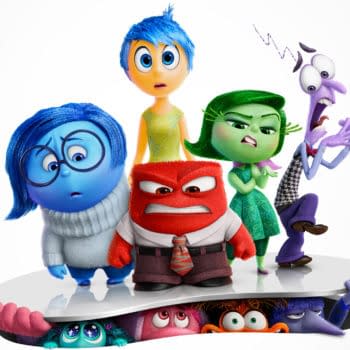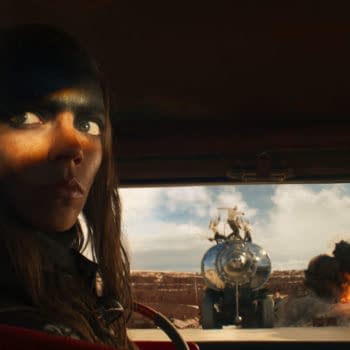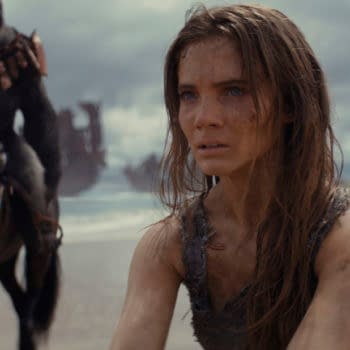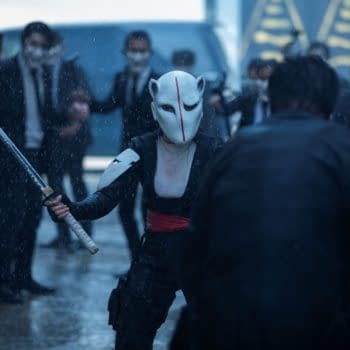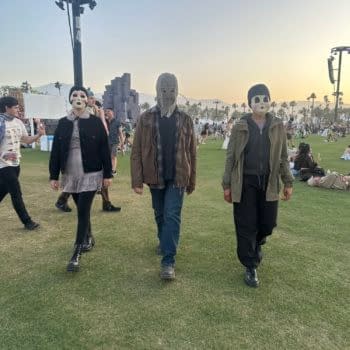Posted in: Movies | Tagged: Alan Moore, Andrew Buckley, Darrell D'Silva, his heavy heart, jimmy's end, khandie khisses, Lex Projects, mitch jenkins, Orphans of The Storm, Robert Goodman, Siobhan Hewlett, the show
All The World Really Is A Stage In The Show – On Set With Alan Moore and Mitch Jenkins' His Heavy Heart
It's a very unusual experience to be a viewer of a film project, from a distance, and to write about it, and then suddenly find myself dropped into the midst of the completion of the project and see it happening in real time. To see the actors in costume and make up, the cords and the equipment snaking their way through the bowels of a venerable historical property, watch people breathing in the cold air, shrugging off and on thick winter coats, and then suddenly, beholding on the monitor the film-world recreating itself in pixels that are instantaneously art, blending seamlessly with previous installments with the light and texture so recognizable as what I had been watching months previously in the quiet of my own home on my computer screen. It felt like time-travel of its least discussed aspect—entering film-time, an enclosed world with its own seasons and development that are quite distinct from external, ordinary time.

As each segment of The Show has been filmed, and completed the clock has stopped and started for James, the often-terrorized pilgrim through the nighttime world of The Show. And at each new filming the clock has started again for him, as if no time had passed at all. In summer I saw him drifting through the strange medieval-play-like allegories of the working man's club in Jimmy's End, meeting Mr. Metterton and Matchbright, compelled to follow Faith and learn about her past and future. In winter, with a veiled sun overhead, I saw him again facing even greater terrors as he descended into a subterranean realm, but at the same time I realized what he might not yet, that the descent is the only way to get to any final answers for him. To determine and learn his own fate, to keep the clock running for him long enough to reach the revelations he is, if even unknowingly, seeking.
On January 14th, I arrived in Northampton in chilly weather, but with sunlight struggling through to grace the rather historically steeped and fraught landscape and architecture so buried in layers of strange incidents that Alan Moore writing his epic novel Jerusalem (now nearing completion) seems the only appropriate response to its legacy. Touring through the epochs that make up Northampton's checkered history, Moore acted as my guide until we reached the portal, of sorts, into film-time. The introduction to that world was a strange mixing bowl of elements when we turned up in the canteen and the crew and actors, some in costume, some not, sipped tea and finished sandwiches.
Siobhan Hewlett had arrived for a visit, and so across the table from each other sat Faith, but not Faith, and Darrell D'Silva, James but not James, one in costume, one not. Real-time and film-time caught up over clinking china cups and D'Silva, who had streaks of gore on his face that initially looked like he had spilled his lunch over himself but turned out to be far more sinister in application, cheerily commented on the horrors he and James had been recently facing. It felt like hearing some outside, omniscient observer commenting on James' afterlife and what he had been up against, with some sympathy. And Hewlett/Faith nodded sagely, and laughed, and commiserated with D'Silva/James. And, like everyone in the canteen, she was anxious that the clock should start again and James should continue on his journey, no matter how brutal it got. Because there was something to be reached, a goal. Though I was surprised, given what D'Silva was talking about in terms of James' recent ordeals, that he could eat lunch at all.

This is part of the crux of The Show, as far as I can tell. That there are layers of experience and meaning, but it's important not to lose that perspective, that it is a "show", a demonstration of the force of perceived experience and what can be learned by going through the motions, taking part in the rise of the curtain, and realizing that this "entertainment" is just that, something requiring participation, endurance, and a puzzling out of meaning that you simply can't reach without having been there. Fortunately for us viewers, we can participate in the film-time with James, and he becomes our proxy, suffering all our slings and arrows for us and to some extent, with us.
I recently heard that scientists have identified the "mirroring" processes in the brain and concluded that when we see someone being tapped on the shoulder, our brain lights up in the appropriate areas as if we, too, have been tapped on the shoulder. In fact, there is no quantifiable difference between those two brain responses, from the one being tapped to the one watching someone's shoulder being tapped. I can easily believe this is true when watching installments of The Show so far, when accounting for the extreme reactions Act of Faith produces as we see Faith struggling with her own need for extreme experiences and caught in an unlucky net of her own devices.
As the world of The Show gets stranger and seemingly inexplicable events occur that defy the laws of physics and real-time, that actually makes no difference at all to our mirror responses. We continue to experience the surreal and painful world of Jimmy's End as if we were there, and be as overwhelmed as James trying to apply the intellect to things that are beyond his intellectual control. In fact, the more confounded the intellect, the more visceral our mirror reactions are likely to be. Mitch Jenkins, the film series' director, seems to understand this very well. He homes in on presenting the direct experiential level in every detail. Handling short episodes, he crams in as much texture and human reaction time as possible, and handles in short form what would take feature filmmakers much longer periods of film time to establish. Other filmmakers may well think that they have to create mirroring principles, and spend labor and time easing you in to that relationship, but Jenkins works with these principles from the first shot to the last, abandoning preamble and handling, in a knowing way, the viewer's identification with James and Faith. This is an undiluted experience of shoulder-tap for shoulder-tap. And if you want to be "entertained" in the sense of close participation, there is no more direct route than the way in which Jenkins plunges you into film-time.

Given my own experience of the first four parts of the film series, walking into that canteen on set was a riot of confused responses for me. We had real-time talking to film-time, and then, the preparations began in order to start the clock where it had stopped the previous day of filming. In the interval while the props, costumes, and equipment were being readied to place James once again in his pilgrim role, I had a long discussion with Siobhan Hewlett and Alan Moore about the nature of semi-historical and often mythological figures and the ways in which several individuals and their actions often become a composite figure over time to the point that it becomes nearly impossible to extract myth from reality, and history from story. Our examples were Doctor Faustus and Merlin, each comprised of several layers of story, and perhaps repeated historical antecedents over time. In hindsight, this was an incredibly appropriate conversation to be having on the set of The Show and even more amusing to hear from Siobhan/Faith and the legendary Alan Moore. They both have become multi-layered now in public perception, and their stories have become bound up with questions of identity.
The Show itself has layers and characters like Mr. Matchbright (Robert Goodman), Mr. Metterton (Alan Moore), and even Bobbles the Clown (Andrew Buckley) and the Dancer Beryl (Khandie Khisses) seem to be aware they are playing a role at times, while also aware of some other form of more consistent identity. In the same way we might ask "Which Merlin are we talking about?", whether the 5th century mad warrior, the romantic prophet, or the black magic lucky charm, we can ask of The Show, which Show are we seeing today? Because it's all a show, all story, all engineered to produce a desired effect in the viewer, to such a degree that while we are aware it's all one thing, we don't know for sure which reflex of identity we are likely to meet at any given moment of film time. And boy is that the problem for our utterly confused and emotionally wrecked James. Without an ability to distinguish whether a given moment will be cruel or kind to him, the arbitrary switching between revelation and torment, a combination of seemingly meaningful things and meaningless things are pretty much engineered to break down his mind. And ours. Because in the end, he and the viewer must reach the level of pure experience if we want to really encounter The Show.

The apparatus that goes into creating such a condensed level of experience is extreme but also ingenious. Working on what, by Hollywood standards, would be astonishingly small budgets, Mitch Jenkins and Alan Moore have devised methods of creating a film world with its own unified aesthetic that would be demolished by the heavy hand of big-budget gadgetry. It's an intricate clockwork that's more about starting with a dismantled clock and with great patience and skill putting it back together barehanded than Hollywood films, which are vast engines factory-made whose parts you are never likely to truly see in motion. They, of course, do not let you behind the curtain, unlike The Show. Here we see the guts of the clock in close-up, and watch them beginning to click into motion, and the simulated experience is rather like seeing a clock begin to work for the first time ever—the wonder of that kind of intricacy returns and also an appreciation for the ingenuity involved.
Coleridge famously coined the phrase, "the suspension of disbelief" which has become a truism about creating narratives for audience consumption. The Show is, in many ways, about the reinvention of disbelief. It doesn't ask anything from you, no indulgent oversights of its rough edges or seams; they are included in the narrative and become part of the problem of the story. It shows you rather than tells you that its world is inconsistent, layered, unpredictable, and comprised of mixed and matched parts. Like human life. We do not escape from life into The Show through an illusion of reality. We are convinced, instead, that reality is an illusion. Disbelief in reality is reinvented. The upshot of this is that having watched these films, the real time world becomes rather alarming and not exactly a welcome relief after the emotional and physical extremes of the films. I'm sure that Mitch Jenkins and Alan Moore would say, "You're welcome" for making the real world into a more haunting one for us through the direct experience created by The Show.

But the films, always expressing these traits, have nevertheless become increasingly bold-faced in pursuing this goal. His Heavy Heart is the culmination of that strategy. I became aware of this while walking carefully around paraphernalia and film detritus that was either incredibly important or nothing at all, as I moved deeper and deeper into the underground filming location in the cellars and crypts of an ancient place receiving a new layer of history and what was undoubtedly the most noise and kerfuffle it had experienced in hundreds of years. It didn't matter if I saw the curtains pulled back on The Show because it could not disturb the ordinary filmmaking goal of suspension of disbelief. Instead, being on set revealed the bigger principles of the film, to show you directly its own apparatus and the fact that apparatus is a given in entertainment, and even in reality.
In an outer chamber where white dust drifted down from the stonework, cast members waited in the wings to enter the carefully controlled filming space—here the film-time and real-time mixed, sifted, and righted itself by passing through plastic curtains. Beyond the curtains, film time was inviolable. In a screening room to one side where copies of scripts, polystyrene tea cups, and a liberal dusting of fake blood wreathed a single high-res flatscreen, we watched film-time unfolding in the sequestered room and counting down as much as up, numbers scrolled with each stop and start of the camera. James' clock was on the move by fits and starts, as his experiences were created episodically, from his POV to his reactions to increasingly emotive situations. Somewhat powerless, he was forced to watch his own fate unfolding, in a haze of glass jars with organs floating in formaldehyde, and under the weight of ambiguous pronouncements made upon him by the denizens of this twilit underworld. He was not without friends, if you can call them that, flanked by Bobbles the Clown and Beryl, whose strangely concerned role in "Jimmy's End" had previously come to the fore. They acted as escorts in a fashion, and choruses taking part in James' descent.
Mitch Jenkins, watching the monitor closely, and dashing between the three chambers from time to time, moved quickly from high spirits and humor to deadly serious pronouncements of his own, capturing each millisecond just so. The reconstructed clock had to be tuned just right to stay on track. Alan Moore watched intently, breaking into friendly conversations between the intense shooting sequences to sign copies of the script for His Heavy Heart and talk comics, filmmaking, and all manner of ideas in between. I asked him what it took for him to make a film, if that was an extreme jump for him. He replied that it was nothing of the sort, that it simply took the right person, Mitch Jenkins, asking him. All Jenkins had to do was ask, and it was a done deal.

But films are not like comics for Moore, he explained. In comics you create a complete universe even in collaboration, he said, whereas in film you lay the ground work for an architecture many others will build, and you may have a rough idea of the shape and structure of the result, but the materials, the aesthetic, that is somewhat beyond your control. But that is not a new method that he is struggling with. Its difference is, to all appearances, invigorating for Moore. Both he and Jenkins exuded a palpable excitement for the medium, a wonder at the achievements of the actors in each take, and humor at the strangeness of their own project. It was clearly entertaining for them amidst the hard work, the cold of a winter shoot, and the plotting and planning necessary to ensure the future of The Show as a feature film, and even, perhaps, a television series. When I asked about the plot for His Heavy Heart and bigger plans for a feature film of The Show, the answers I received were in fact bigger than I could have imagined. Many of the elements of revelation that will be spelled out quite distinctly in His Heavy Heart are what enable the project to become a feature film or TV series rather than remain a series of masterfully stitched together vignettes.
Like a good mystery, the pieces have been visible in plain sight all along, even occasionally hinted at rather strongly, but it's unlikely viewers have yet realized where the plot of the series is headed, at least I hadn't yet. Things turn on James, yes, but also on Mr. Metterton and Matchbright, their goals and motivations, and defining the exact nature of the dream-like world they inhabit. Those elements of ideology and characterization weren't included purely for spectacle or "show" in A Professional Relationship. The relationship between the two figures of Metterton and Matchbright has much wider implications for the film-time of The Show and for our understanding of how the story relates to external reality in our own daily lives.

For me, it was the missing piece that explained just why Moore and Jenkins have created this project and become so devoted to it. The project that pulls back the curtain on the role of film and storytelling in general has commentary to provide on the role of media and entertainment itself. As I wiped fake blood off my hands and crawled out of the medieval cellars where the cameras were powering down and everyone was trying to get some warmth back into their limbs, Moore left me with a final idea to consider: that on a significant level, The Show is about "entertaining you to death" and critiquing the ways in which we engage with entertainment.
I took that to mean that the film series strips away pretense and takes you directly into the experiences viewers are seeking, taking the mirroring effect of viewership by the throat and exposing our own needs while giving us much more than we bargained for. By doing that, it invades reality. Like Faith, our games, the ones which we are seeking out, become too real and we get what we wish for. We become aware of the games we play with life and that our dream worlds and our imaginative worlds have bigger consequences than we are prepared to admit. And that may be the most realistic message I've heard from a film project in a very long time. As a viewer, I won't be able to see The Show the same way again now after being on set; I have to see it as a documentary about human beings shot with unerring honesty. But that's ok because that's where James, and viewers, were headed all along.
Massive thanks to Mitch Jenkins and Alan Moore for inviting me along to the filming of His Heavy Heart. I can only hope that filmmakers are inspired by your commitment to this project and learn from your ingenuity in creating films that don't require billion dollar budgets to say meaningful things while celebrating the strengths of the medium.
*Photos are courtesy of Mitch Jenkins and Lex Projects, taken on the set of His Heavy Heart by Mitch Jenkins and Lou Boileau
Hannah Means-Shannon is EIC at Bleeding Cool and @hannahmenzies on Twitter











